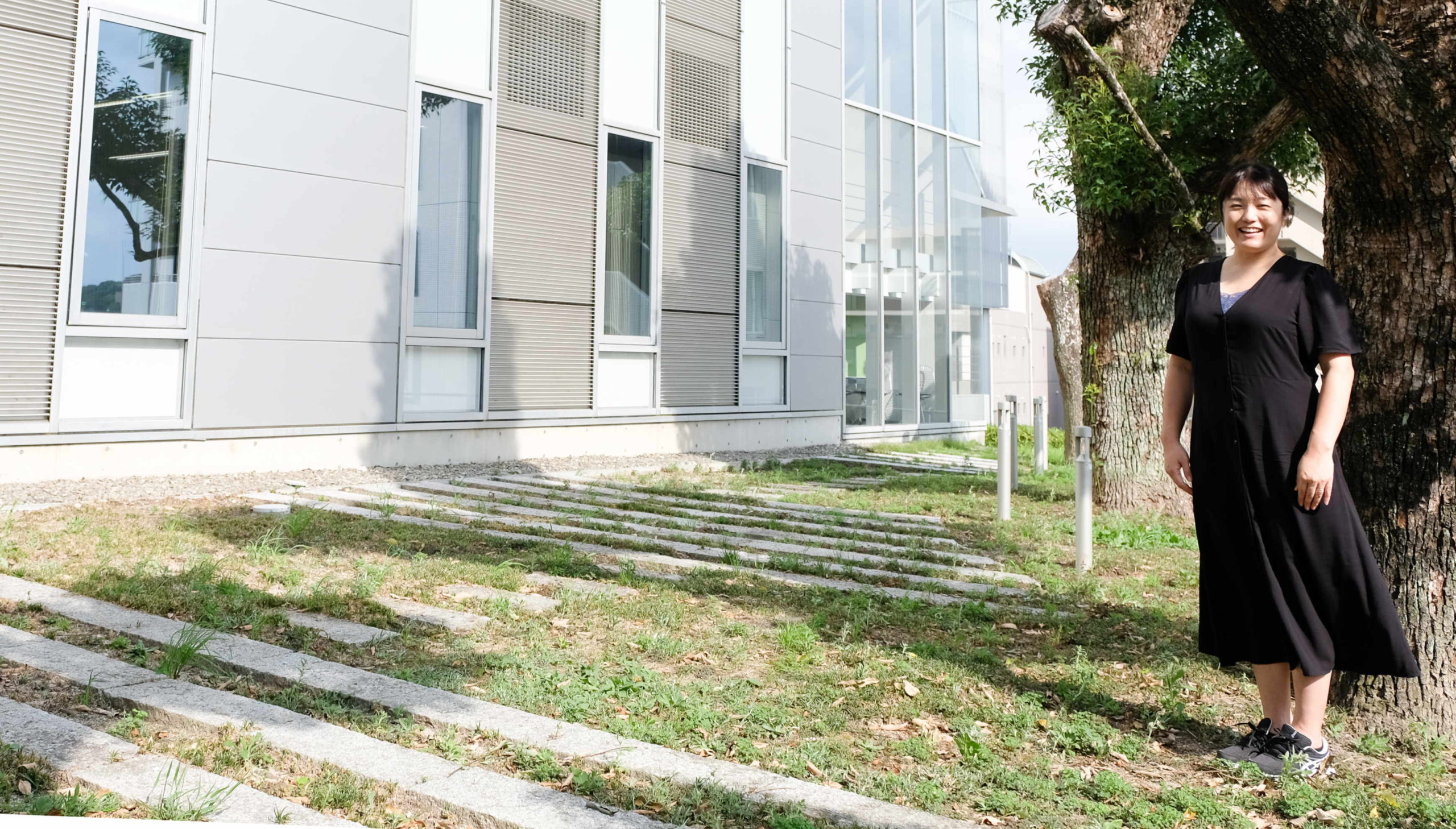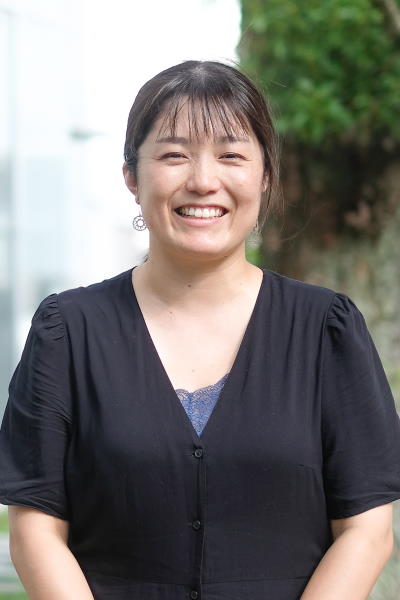-Please tell us how you got interested in Africa.
When I was a child, there was a picture book at my home and I found the Maasai tribe with beads more colorful and cooler than anything else. I became wanting to go to Africa someday and meet these people.
When I was an undergraduate student, I belonged to a non-government organization and planned activities and charity concerts to raise funds to construct primary schools in African countries. As I wanted to go to Africa once I joined a volunteer work in Tanzania when I was a second-year student.
-What was your experience during your stay in Tanzania?
We planted trees around the elementary school in a village. We worked for about a month with youth from various countries. It was a lot of fun interacting with people from different backgrounds. I remember everything about my first trip to Africa. We were always talking about how children would be happy to have trees providing shade.
After returning to Japan, I kept communicating with the organization staff in Tanzania. A few months later, I asked how the planted trees were going and I was shocked by their answer. “Goats ate them all” (Laugh).
-Goats ate them all!?
In fact, the organization staff did not properly explain the objectives and backgrounds of the planting activity to villagers. The villagers did not know why the trees were planted. They never even thought they wanted trees at the school. Therefore, nobody looked after trees, and goats ate trees as tasty sprouts.
I thought I had done something good for the village, but was wrong. I realized the difficulties of volunteering and providing support for others. Since then, while I held a study group and read books, I was keenly aware of my lack of knowledge and narrow perspective. So, I decided to go on to graduate school to learn more.
-What did you work on in graduate school?
SKY project has focused on the manufacturing sector, especially the garment industry. But I researched agricultural TVET (Technical and Vocational Education and Training) when I was a graduate student. In the master’s program, I investigated educational perspectives, especially those on soft skills at the agricultural TVET college, which trains agricultural extension workers in Ethiopia. The agricultural TVET college curriculum emphasizes the importance of soft skills for extension workers to provide training to farmers effectively. However, when I asked the college teachers, extension workers, and farmers what they consider soft skills are, each person had a different answer, and there was no consensus.
For example, teachers said “because extension workers are in the position to teach agricultural techniques, they must know good teaching. That is one of the important soft skills.” But in reality, farmers often have more knowledge and experience than extension workers. Also, extension workers tend not to be in a position to teach but more of a coordinator or transmitters of information between farmers and the government. The teachers did not know the situation because they graduated from education or agriculture faculties. They had rarely worked as extension workers on the ground nor had communicated with farmers.
Facing such realities, extension workers get in trouble as what they learned in the classroom is different from what happens on the ground.
-Are the statements in the curriculum of agriculture TVET insufficient for preparing good extension workers?
It is a difficult task to know how to integrate the curriculum into the teaching practices in the classroom and whether the abilities intended to be cultivated in the curriculum are acquired by students as a result of the learning process in the classroom. There are different levels of the curriculum; planned by the government, understood by teachers, implemented by teachers, and acquired by students. In addition, there is the so-called “hidden curriculum” which is the cultural and moral values transmitted through participation in school activities and exposure to the behavior and attitude of teachers. As a result of the inter-effects of these different layers of curriculum, there arose discrepancies between the curriculum originally intended by the government and that experienced and learned by students.
-The curriculum to develop soft skills seems particularly difficult.
There are various curricula that intend to teach soft skills. For example, the TVET school curriculum which I surveyed treated skills for communication and teamwork as forms of soft skills and aimed to develop them. However, to begin with, the definition of such skills is vague, and teachers cannot grasp how to teach them. Therefore, I observed some teachers who ended up giving a lecture on what communication is. In other cases, teachers ran out of time to teach, so they simply interviewed students and concluded their communication skills are fine because they could talk well.
-Did you also research on the curriculum in the doctoral program?
Yes, I continued my research on agricultural TVET colleges in Ethiopia but with a closer focus on the gender-sensitive curriculum. When you hear “the curriculum to train extension workers who can implement the gender-sensitive agricultural extension,” there would be no objection to its importance. However, just like soft skills, in reality, as there was no clear definition of gender sensitivity, each teacher implemented the curriculum based on their own interpretations. For example, some teachers talk of respecting women straightforwardly, while others consider it as a matter of their own treatment of female students in TVET colleges. Still, others referred to the example of villages where men and women do the same work in their lectures. All of them claimed that they are practicing the gender-sensitive curriculum properly, based on their own judgment.
In addition to the investigation of different perceptions and practices among teachers, I have also conducted fieldwork in rural Ethiopia and analyzed the gender-sensitive curriculum from various perspectives. Some of the questions I considered include ‘for what purpose this curriculum is implemented’ and ‘whether the voices of farmers are reflected in it.’
■ Research on the SKY project
-Please let us know your involvement in research by the SKY project.
In Ethiopia, there are programs coordinated by TVET schools and private sector factories to provide practical training named “cooperative training.” Each week, students spend one or two days in school and three or four days at factories for training. It is a program intended to combine the benefits of school education and apprenticeship. The aim is to let students experience the ways to apply theories learned at school. However, school-taught contents don’t always correspond to the practical work and the SKY project data indicates that there is no statistically significant linkage between them. Previous researches criticize the lack of preparation to accept student-trainees in factories. However, I would like to highlight the importance of soft skills which student-trainees have.
I would like to introduce cases that I have observed at factories. For example, some factories allow workers to pick up preferred tasks each day according to a first-come-first-serve basis. In that case, someone who arrives late would not have a chance to choose preferable work but to clean the compound. Also in small and medium-sized factories which do not have the capacity to assign instructors, if they want to learn something, student-trainees have to imitate the practices of senior workers or ask questions proactively. Furthermore, to get paid employment, a student-trainee needs to sell himself/herself, for example, by showing the factory manager what he/she has done and demonstrating his/her skills. Proactive student-trainees will be evaluated highly. On the other hand, student-trainees who are passive or not punctual may never touch a machine, even if they go all the way to the factory. Given these examples, we can consider that the soft skills, the capacity to develop good interpersonal relationships and attitudes toward work, that student-trainees have would affect their acquisition of technical skills and their evaluation in the workplace.
-We can see the importance of soft skills.
School is an environment where students do what the teacher tells them to do, and if students make mistakes, teachers will point them out. Students can be passive there, but they are required to be proactive at work. Students notice this while they are out in the factories as trainees, and acquire skills to communicate and learn proactively, which can be considered a part of soft skills. Rather than discussing how to teach communication skills at TVET schools, I believe that the student-trainees can learn practically by going out into the field. Therefore, promoting the collaboration between TVET schools and industries is important for human resource development responsive to the demands.
-When did you participate in the SKY project?
After I was appointed as Designated Assistant Professor at Nagoya University. At first, we had several members working on it, but since each had different themes and methods, we had no choice but to narrow it down to one in order to achieve results. We thought then we should start with the test and started by devising the method to measure the practical skills.
Since then, the number of participants has gradually increased. Making written questions in calculation and sewing, and adopting practical measurements suitable for African participants, the research began to take shape.
-How is your research in the SKY project?
In the SKY project, you can research anything that you find “interesting” so far as they are related to the skills and knowledge of the youths in developing countries. I think in other research projects, the objectives and methods come first and the roles are often assigned within the framework of a budget and roadmap. But in the SKY project, if you say “I am interested in this” or “I want to do this,” everybody will support you.
It is a very attractive project for researchers who have something they want to do so I want many scholars to be more interested in the SKY project.
-What are your future prospects with the SKY project?
Actually, I haven’t been able to participate much recently. Since I have a child, I couldn’t get as much time for research as I wanted because of childcare and work. I became more and more stressed that things were not going as planned. However, when I discussed this with Prof. Yamada, she told me “because people have different life stages, it is fine if there are times when you cannot participate. I want to make this project a place where members could return at any time. For that purpose, I try to keep the SKY flag raised.” Now I am a little bit away but I would like to return to the project one day.




